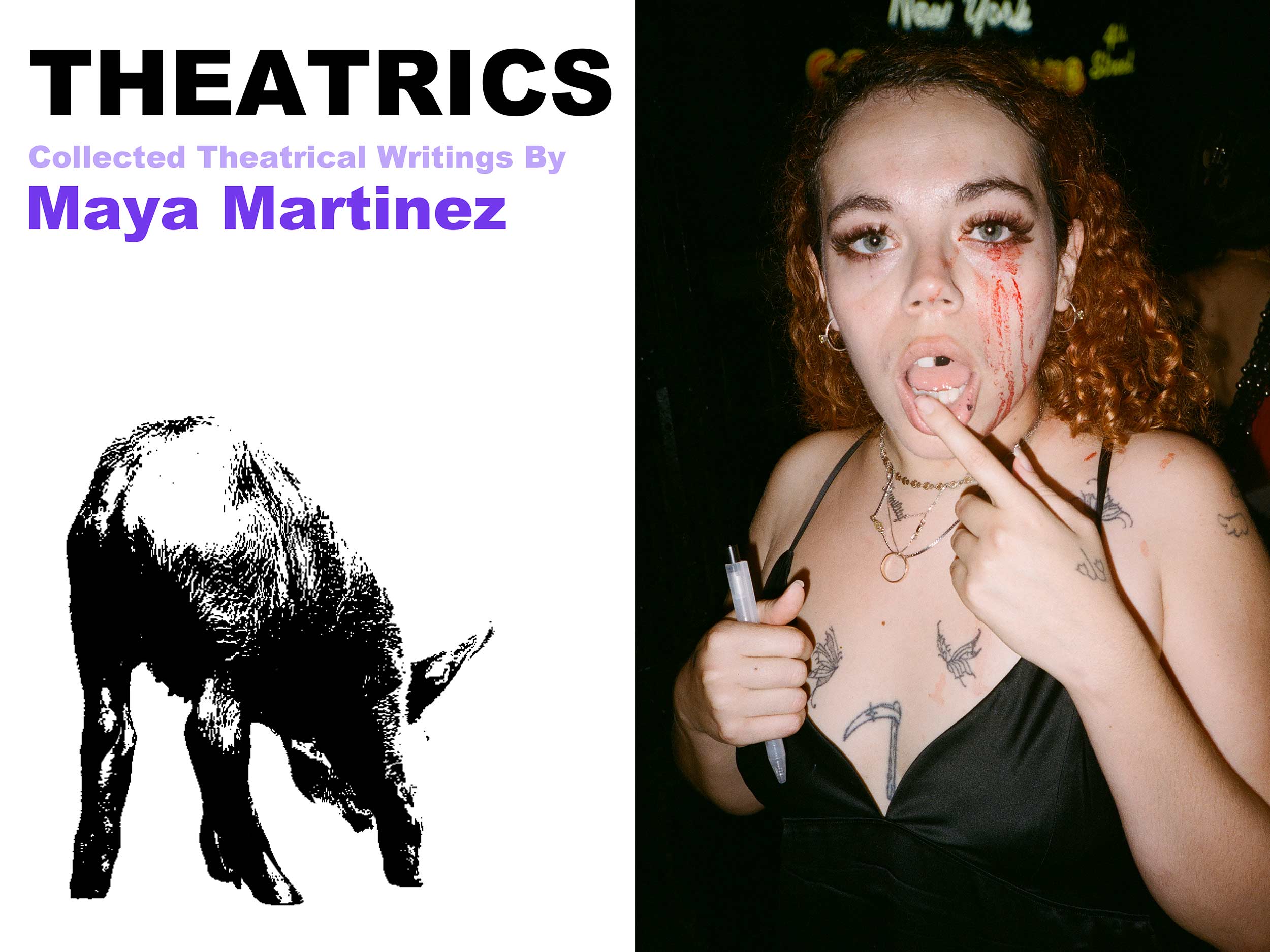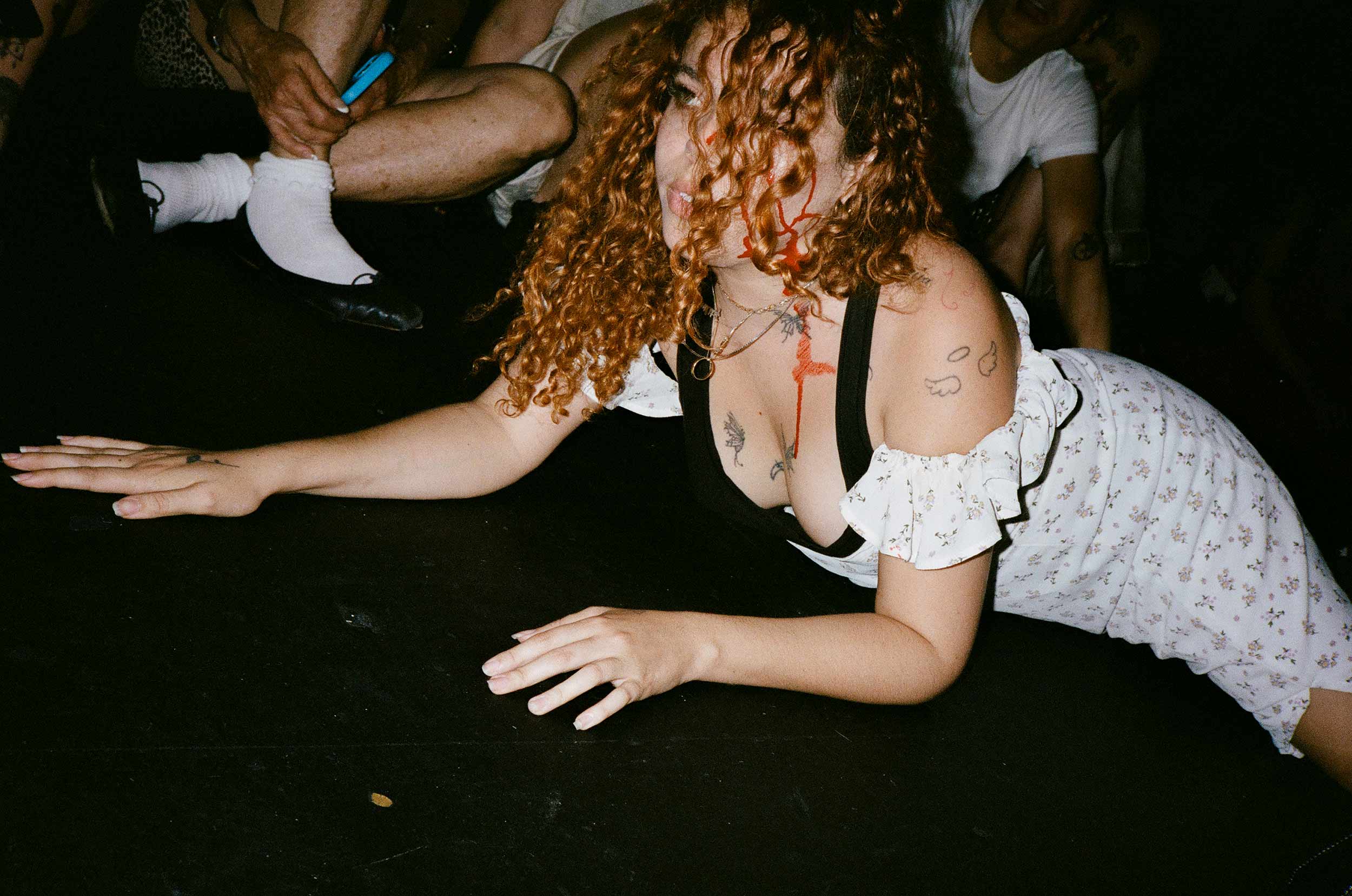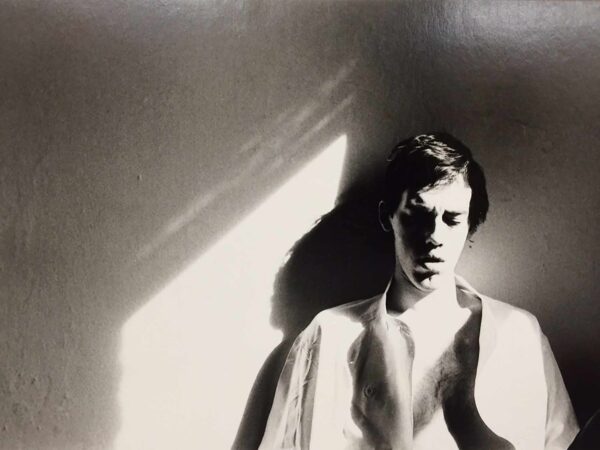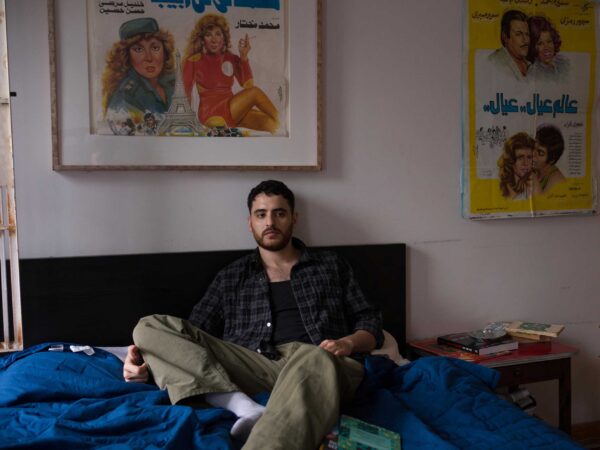In her new book ‘Theatrics’, the playwright-performer draws on Texas Roadhouse, Desperate Housewives, and TikTok spirals to stage a new kind of existential comedy
In Maya Martinez’s Theatrics, a collection of seven theatrical works written from 2017–2024 and just published by Wonder and Meta Label, reality is slippery. In “Hole Play,” a woman just wants to pick up her angel and devil adult costumes at Party City at a Floridian strip mall, but an infinite hole has opened beside her car—and nobody seems to care. In “Stage Directions for a Car Crash,” someone dreams of a better tomorrow—listening to, as the text repeatedly states in full, “the song ‘Tomorrow’ from the hit Broadway musical Annie” on the radio—as they get in a car crash. More a prose-poem than a “play” in a strict sense, the character’s only lines are: “Hello! Hello!” Meanwhile, in “Vehicular Manslaughter in Ibiza,” the ill-fated man behind the wheel begs his dogsitter in a series of letters to stay a few extra days and protect his home’s venetian plaster as he tries to get out of jail. There’s a play called “The Play.” In it, a pig and a lamb smoke weed and scroll Instagram while musing on the future of their inevitable slaughter.
Throughout Theatrics, several people lose their minds—or perhaps reconfigure them and find revelation. In Martinez’s plays, ethics and philosophy fuse with last night’s parties, tomorrow’s crushes, the apocalypse, Texas Roadhouse, and the ontological haunting of the earth. The more familiar something seems, the more unnerving—and hilarious—it becomes.
In the past, when Martinez has performed these works at institutions including Hauser & Wirth, MoMA PS1, and The Poetry Project, she used no sets and minimal props. Only recently, since the launch of the book, has she involved other actors, costumes, or the occasional outside object. Despite their often minimalist staging, the written plays’ “settings” sections are lush with description: “All the medians in the parking lot hold gross small bushes which are a soaking mirage. A row of shopping carts intersects with the shadow of a palm tree. Hilarious isn’t it? The trench catching run off water and pesticides.” They make demands on spacetime: “There is no beginning or end to this scene, if they exist, they exist elsewhere. What is here is middle. No build up or falling action, just hanging time.” The stage directions read like riddles and prophecies, telling actors “they should embody a begging spirit” or turn “their whole body into a shaking whine.”
Cobbled from language appropriated from television, social media, news footage, and her friends as much as conjured from the vortexes of her sui generis poetic mind, Martinez’s worlds get closer to the truths of ours by being unhinged from them: hers is a twisted philosophy of gags, of speeches observational or life-shattering, of comic sleights of hand, and of questions whose answers must always be out of reach; the book’s back copy reads: “Do you know what your soul wants?”
Not yet.
Far from the existential splendor of humid parking lots and seaside Spanish prisons, yet no less ensnared in all the ecstatic polycrises they might represent, Martinez and I met in Manhattan over dumplings (vegan, green-colored) to discuss the life of the entertainer.
Drew Zeiba: I’ve seen you perform several of these plays. And most of them are one-person, or staged with two characters played by a single person. Do you write with yourself in mind as the performer?
Maya Martinez: I’ve never had it not be me in it. [Laughs.] I do take great inspiration from myself. But also, I am so inspired by my friends. Like in ‘Hole Play,’ where she’s like, I was at a rave the other night and we took ecstasy, and my friend told me that bystander syndrome didn’t exist. That happened. It is all from my life. It is just fun doing it with me and being like, Oh, I know how I want this to be performed. Or working with a director to extend that performance into something more legible than I could think of alone.
When I write, I want to play with the mouth, and I want to play with the audience, and I want to play with sound. In pieces not included in this, I love sometimes screaming part of a poem. In ‘God Sized’—the dick sucking play—I was thinking about limerence, and I was like, It would be funny to have a play that is never supposed to be actually acted by two characters. The gag is that it’s two characters played by one person.
Drew: There are also many instances in which there’s a structuring absence, or a second character who is not there. Janine—the character whom the star of ‘Hole Play’ is talking to on the phone—is never actually there and has no lines the audience hears. There’s no Terry B on stage but she’s being addressed directly as a recipient of monologued letters in ‘Vehicular Manslaughter in Ibiza.’ Like you said, in ‘God Sized,’ there is another character, but you’re speaking both roles and basically repeating yourself—but with one person becoming increasingly unintelligible because they have the other character’s dick in their mouth. Sometimes, like in ‘I Lived How I Died,’ there’s a break, or a ‘you’ that might be the audience, but it’s so abstracted as to also be a sort of general ‘you’ related to the character. I’m wondering about these absences or distances or modes of address.
Maya: I don’t know if I’m consciously thinking about it, but it is there. I love a gag. And for ‘Hole Play,’ I thought it was just so funny for it to be a one-woman show but she’s on the phone the whole time. And to be honest, that play is about having a best friend who doesn’t believe you—which is so petty.
With the self-help monologue, ‘I Lived How I Died,’ I wrote that piece as my first performance post-Covid and I was really interested in the language of this person on Instagram I followed for years, who watched a lot of Jim Rohn self-help speeches, and she was involved in Herbalife. I was also watching a lot of Desperate Housewives. And then watching teenagers on TikTok being like, ‘When I look in the mirror long enough I don’t recognize who I am.’ I wanted all this found language to be connected. I knew I’d be performing it for a room full of people, so I wanted it to be inspiring in a way. I also think that structure is my favorite way to divulge details.
Drew: How so?
Maya: I’m telling a story in this way that the next sentence could be completely insane because I’m talking to this other person who has the context that the audience doesn’t. It’s like, What am I gonna pull out of the hat next?
“I think you really have to hypnotize people with performance”
Drew: Your plays have a lot of philosophy that’s already suspect as soon as it’s delivered. Well, maybe not always. The narrator of ‘Hole Play’ is quite compelling and convincing. But she’s also in part convincing because she appeals to authority in different ways. She suddenly has an advertising voice. She has encyclopedic knowledge that occasionally spills forth. Similarly, in ‘The Play,’ about Pig and Lamb, you’ll have phrases of spiritual reflection like ‘Not to sound like a hippie but I personally believe when my pig body is chopped up in the smoke house and I’m turned into bacon for breakfast my little pig spirit leaves the food I am and I become part of the person who eats me.’ But then it just goes back to sorta normal conversation. Or a really surreal conversation about, like, wet T-shirt contests. Or a speech. There’s the interpenetration of all these different languages. How are you holding all these different voices?
Maya: I love that formula, because you do get to be so silly, and then you get to be something really truthful. You create something that holds someone’s attention for so long. I do feel like you do have to be like, First, I’m bringing you in with the situation. Then, I’m divulging some details to paint the picture. Now, here’s a truth about the world.
Drew: Yeah, because if you just say the truth from the start, you don’t have people on board.
Maya: I think you really have to hypnotize people with performance. One way to get people to learn is to make them laugh and to entertain them. And I do think entertaining is a skill, and not everyone can do it and not everybody needs to do it. I feel like my weak spot is writing not to entertain—that’s a totally different challenge.
Drew: Having mostly seen these plays performed, it was interesting to read them on the page for a variety of reasons, one of them being the stage directions. They’re often quite abstract. Or they’ll be conversational: there’s a rhetorical question—’Hilarious isn’t it?’—in the ‘Setting’ for ‘Hole Play’—which also doesn’t have a set in any case. There’s also ‘unnecessary’ information repeated for comic effect, like saying ‘the hit Broadway musical Annie’ as a repeated phrase in ‘Stage Directions for a Car Crash’—which is, in fact, almost only stage directions. How do you think about stage directions, and how do you think about these plays not as performances, but now as a print object?
Maya: Originally, I really thought about these as poems, or as longer poems becoming plays. And the play is a poem. In ‘Hole Play,’ when she just starts losing it and being like, ‘The continental crust is only like what 25 miles down?’, it doesn’t have any form [on the page]…
Drew: It becomes lineated instead of in a paragraph or something.
Maya: I wanted the play to turn into a poem, and so suddenly she’s speaking a poem. For me, that’s also what stage directions are: the stage directions need to be a poem in themselves. In the first piece in the book, ‘Stage Directions for a Car Crash,’ I started that piece because I couldn’t stop listening to that song ‘Tomorrow’ by GloRilla. Then I was like, Oh, it’s based off the song ‘Tomorrow’ from the hit Broadway musical Annie. I thought the concept of tomorrow was so beautiful. Like that everything could just come tomorrow and it’ll be better than what today is. And I was just like, It’s so funny to get into a car crash and have that song playing, and also the gag of starting a poetry reading like that—I’m on the ground and I’ve been killed by life. I would just perform it, I didn’t have it written down. It is all just stage direction, which I think is beautiful and theatrical. But when I was writing it, I was like, the reader has to get how funny it is when I’m doing it.
Drew: The title of the collection, Theatrics, is really interesting to me. You were talking about being an entertainer and humor, and ‘theatrics’ can be this almost dismissive thing of being like, Oh, here she goes with her theatrics again. But it also is a theoretical title. It’s proposing that this book describes theatrics as such. I’m curious about that word.
Maya: Well, it was originally gonna be Theatrical, because I was like, Oh, it’s so of the theater. [Laughs.]
Drew: But you mostly don’t perform in theaters.
Maya: No I never do. But it’s fun to be at the poetry reading being theatrical. It’s fun. I’m a slut for ‘Yay!’ [Claps hands.]
Drew: You live for the applause.
Maya: I live for the applause. It feels so good. It feels so good to perform. But I was like, all these works have a theatrical tendency, even if it’s a poem or short story, there’s this zhuzh to it. So then we shortened it to Theatrics, which makes perfect sense in this way.
Drew: There’s such a sonicity to the work. There’s a lot to how the language is stylized on the page. There’s this use of repetition. There’s this way that it goes from really dialogue-like or even intentionally clichéd daily language to something that’s not normally spoken. These intentional swerves. The language feels very material to me. The shape of the mouth is also a stage direction or a question in some of these plays or poems. How do you approach the materiality of language or language as material?
Maya: Language is so fun. [Claps between each word.] Language is something we get to play with every day. [Giggles.] It’s a free toy.
I feel like I’ve been put in a lot of situations through jobs where… Like I used to be a hostess at Texas Roadhouse, and to this day, that’s part of the end of the pig and lamb play: ‘At Texas Roadhouse all our bread is baked fresh every five minutes, our steaks are hand cut, and all our beers and margaritas are served ice cold, all our soups, sides and salad dressings are made from scratch.’ That just haunted me my whole life. That language reminds me of being in this place. Going to Texas Roadhouse is like going to Disneyland. And then with ‘I Lived How I Died’—when Edie dies in Desperate Housewives, she has a monologue, and it just goes, ‘I lived how I died.’ I mean, she says some different things than I do. [Both laugh.] She keeps going. But it’s just beautiful. It’s beautiful opening an influencer’s instagram and hearing the language they’re using: [in influencer voice] ‘Hi guys, today I’m gonna duh duh duh duh duh…’ Everybody’s playing with it. The language gets to live in me and I get to deliver it and that’s another way the materiality happens.






















